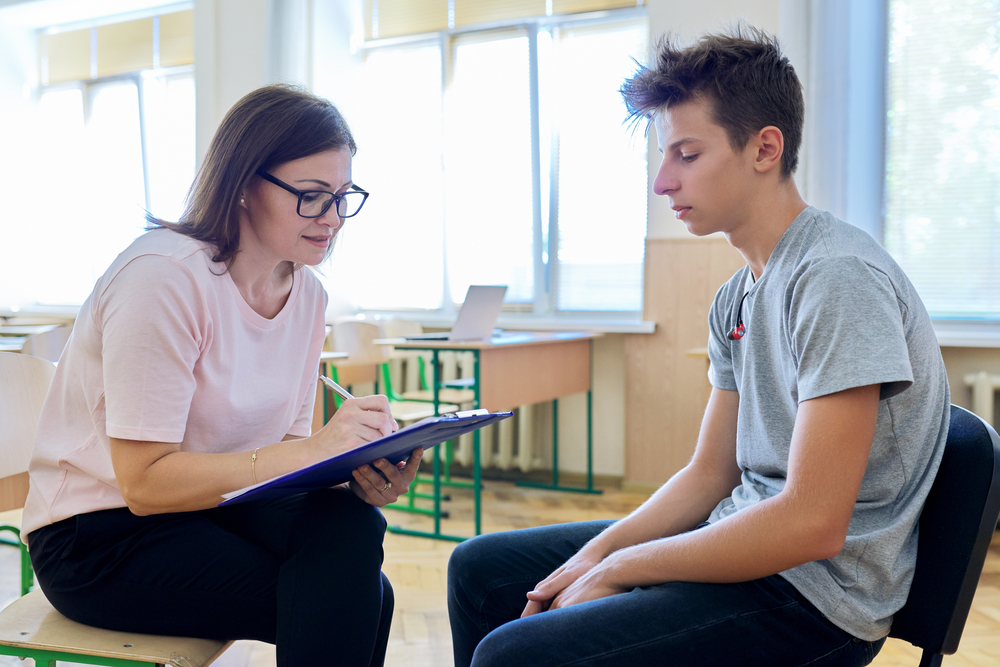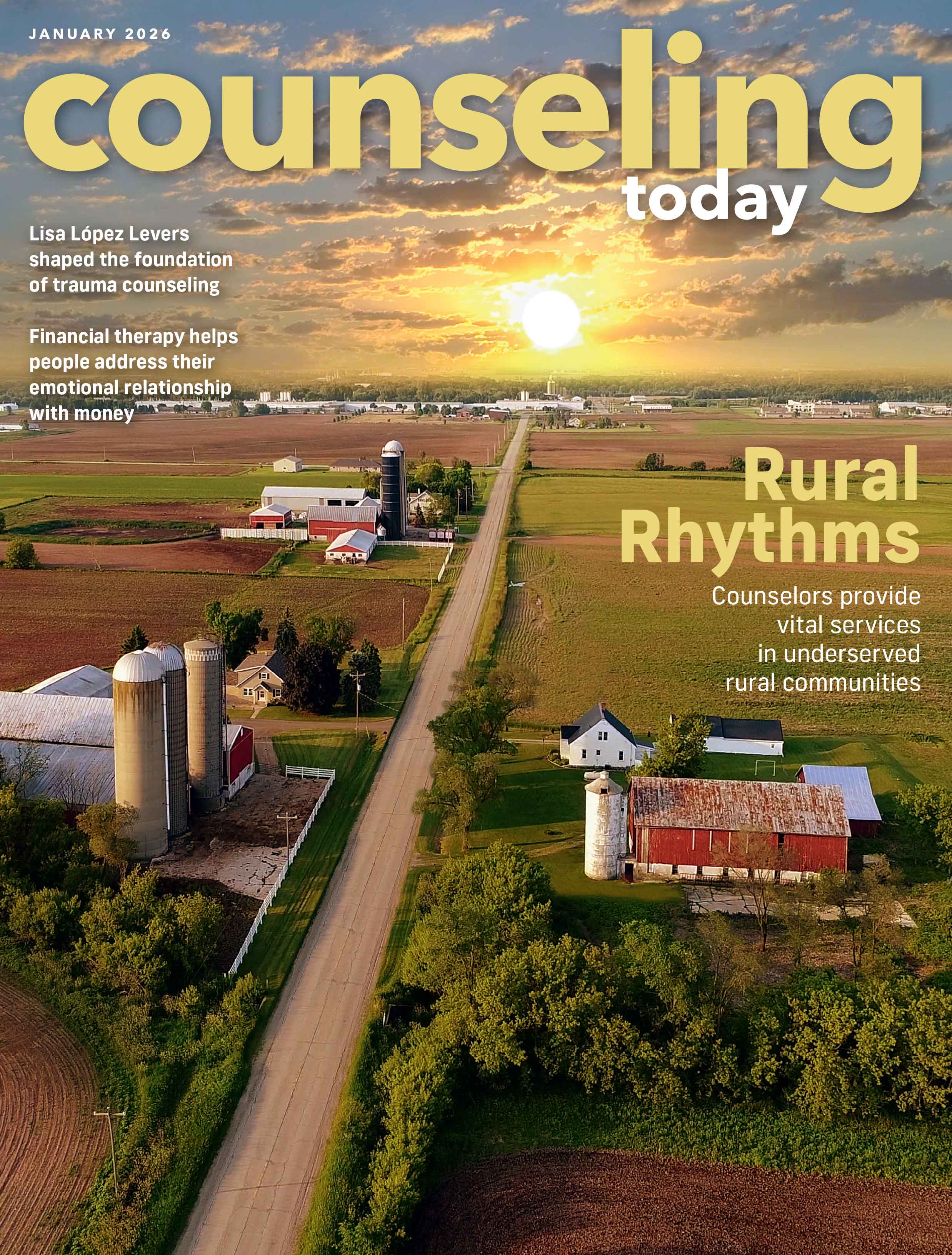Don’t forget school counselors on the list of first responders
By Jetaun Bailey
August 2023

The American School Counselor Association states that school counselors assist students with concentrating on their academic, professional and social/emotional growth so these students can succeed in school and be ready to lead fulfilling lives as contributing members of society. Based on our experience, however, there is a significant role related to mental health — which falls under the heading of social and emotional growth — that is often disregarded. School counselors are first responders to mental health concerns.
Who are first responders?
The U.S. Homeland Security Presidential Directive 8 defines “first responders” as “those individuals who in the early stages of an incident are responsible for the protection and preservation of life, property, evidence and the environment, including emergency response providers …, emergency management, public health, clinical care, public works and other skilled support personnel … that provide immediate support services during prevention, response and recovery operations.”
The national Mental Health First Aid program has broadened the first responder role to include people who, through specialized training, can identify, understand and respond to signs of mental illness and substance use problems. This cutting-edge public education training enables individuals to approach someone who may be experiencing a crisis or developing a mental health or drug use problem and provide that person with the early support and treatment they require. The National Council for Mental Wellbeing and the Missouri Department of Mental Health manage and operate Mental Health First Aid, a training course to help people identify, understand and respond to signs of mental illness and substance use disorder.
Unfortunately, it seems that many people don’t naturally associate school counselors with the role of mental health first responder, even though it is imperative to their work (and the same holds true for teachers). In fact, school counselors may naturally take on the role of mental health first responder without even realizing it.
The school counselor’s role in responding to mental health crises extends beyond simply making the proper referrals to the right people. School counselors must maintain control and defuse situations before making these referrals, which might happen right away or may take days. School counselors engage with students who are having suicidal thoughts or emotional breakdowns caused by loss or personal trauma. Other common scenarios include students struggling with anxiety or depression after receiving a poor grade, a failure to live up to parental expectations causing issues at home, and inferiority complexes that feed into low self-esteem and a desire to quit school. The school counselor must be prepared to handle these mental health crises as a first responder even though the crises may occur at any time throughout any given day in the school building.
School districts are increasingly offering in-house mental health services coordinated in conjunction with outside providers. However, this does not diminish the responsibility that the school counselor has at any given time to respond quickly and convey concerns to the mental health coordinator at the school. For instance, during the time that we (Jetaun and Cheryl) worked together as a school counselor and school counselor intern in Alabama, Hurricane Katrina caused a surge in the number of children transferring from schools in Louisiana. We suddenly found ourselves trying to help an influx of new students with issues such as missing grades, ongoing academic preparation, worry and anxiety about adapting to a new environment, and the depression that could arise from it all. In response, we had to collaborate to develop programs and resources and think quickly as new scenarios arose. We carefully surveyed each student’s situation and assessed their needs, just like any first responder would, to prevent problems from being exacerbated. This is an example of what school counselors can experience, even if their district offers additional mental health services.
A 3-step approach to helping students
 We
believe that school systems should invest in their school counselors
(and teachers and other school professionals) by providing additional
mental health first aid training. School systems could also consider
other measures to aid school counselors in further developing their
overlooked role as mental health first responders.
We
believe that school systems should invest in their school counselors
(and teachers and other school professionals) by providing additional
mental health first aid training. School systems could also consider
other measures to aid school counselors in further developing their
overlooked role as mental health first responders.
We propose that the path to resolving many of the mental health issues that today’s students face can be broken down into three components:
- Awareness
- Commonality
- Communication
Morgan Alford, who recently graduated from high school, helped us with this three-step idea during her senior year (with the approval of her parents). Her insights were based on her firsthand experience of problems as a high school student and the multiple testimonies she heard of how students struggle in high school settings. We therefore thought it appropriate to include these components and elaborate on what Morgan believes can aid school counselors in their sometimes-unwitting capacity as first responders to mental health issues.
Awareness
In Morgan’s experience, high school students do not generally understand common problems such as anxiety and depression. Absent additional context or complexity, these concepts can hold a wide array of meanings for high school students. We believe it would be helpful if mental health was included in the curriculum to teach students quick lessons, facilitate group conversations and provide a general mental health vocabulary check.
Educating students about anxiety and depression concerns might decrease the amount of time school counselors and other professionals spend assessing emergencies. With this understanding, students might be able to describe what they are feeling much more clearly, as opposed to not knowing how to articulate what they are experiencing. This pre-planning would enable the school counselor to offer the student the best assistance and recommendations. This situational awareness also clarifies the challenges that school counselors confront every day and improves their understanding of how to react swiftly and effectively to circumstances.
Commonality
Teenagers are often unaware of how prevalent some of their internal conflicts are. From their perspective, maintaining the status quo might seem simpler than acknowledging the inner fears or struggles they think they are handling alone. The definitions and words acquired through the “awareness” component can be made more personal for teenagers by offering statistics — exactly how many of their friends are experiencing some type of mental or emotional struggle — and advancing the discussion about why these numbers are rising. Morgan told us that rather than merely acknowledging their own issues with mental health, individuals need to understand that improving student mental health as a whole is a goal to work toward.
Communication
Communication is the third, and arguably most important, component. Once teens are aware of what constitutes mental health, understand how common issues are and can recognize struggles within themselves, a safe environment has to be established for them to feel comfortable talking to an adult or counselor about something so personal. The people best equipped for these situations are school counselors, but according to Morgan, many high school students aren’t aware of the role of their school counselors or where they are located. It is important to announce and establish these connections with students while also making it crystal clear that confiding in these counselors about anything at any time is acceptable.
Additionally, when counselors and authority figures develop one-on-one relationships with students, this better fosters an open and positive mental health culture in schools. For example, students could respond to questionnaires or Google Forms that counselors use to initiate small, but meaningful, conversations. Just one-minute, individual meetings between a student and a counselor can open a gateway to alleviating a teen’s inner turmoil.
Even under ideal conditions, there are always outliers — students who are more private, more reserved or more volatile than others. The key to reaching all students is meeting them where they are comfortable rather than imposing on their boundaries. Students want to feel like individuals and young adults rather than patients waiting for treatment. Practicing empathy, understanding that baring one’s soul to another is terrifying and knowing how to comfortably move past that will yield results. Vulnerability is a gradual process, but toeing the line between peer and authority figure can go a long way.
As this article demonstrates, school counselors can unwittingly serve as first responders in the field of mental health. There are steps that can be taken, or simply reinforced, to improve awareness, shared experiences and communication that will ostensibly aid in assessing mental health crises when they occur.
Bringing the components to the school counselor
Many school counselors perform the unrecognized task of being a first responder to mental health crises. According to research, the demands placed on first responders — including their repeated exposure to crisis situations — can cause stress that exacerbates depression and anxiety. Given that school counselors must deal with resolving daily crises that may increase their stress levels, especially in more challenging school environments, we may speculate that this is an underlying factor in school counselor burnout. This is similar to what is observed with first responders such as firefighters, police and others.
School counselors may frequently work in isolation, depending on the size of the school. As a result, crises may interfere with their regular schedules or duties, adding a great deal of unnoticed stress to their lives. We believe school counselors could use components such as awareness, commonality and communication to ease some of their stressors. These efforts could be carried out through their local school districts or among their own colleagues.
Awareness involves raising school counselors’ recognition of what they might be experiencing if they are not taking breaks or if they are taking work home to catch up. This can help school counselors become more mindful that work is extending beyond the workday and into their personal time.
Because some school counselors work alone, districts should put in place budgets that fund attendance at state or national conferences so that individuals can share experiences (commonality) and gain additional resources as their positions as school counselors are becoming more complex and demanding.
Finally, as it relates to communication, districts should host monthly or bimonthly meetings for school counselors to discuss pressing issues that they may be facing within themselves or as a result of workload responsibilities and what those workload responsibilities look like for each individual.
First responders routinely meet situations head-on and provide the appropriate services or resources thereafter. In the case of school counselors and teachers, this service isn’t always recognized or applauded. Once we properly understand the load that comes with repeatedly handling crises, more resources should be provided to help alleviate the emotional heaviness that occurs for these professionals day to day. The recognition of a job well done should be more commonplace in the lives of first responders — including school counselors.
Jetaun Bailey holds a doctorate in professional counseling and supervision. Jetaun is a college professor, a professional licensed counselor, an evaluator and a certified school counselor. Contact Jetaun at jetaunbailey@gmail.com. Cheryl Allen is an educational specialist in school counseling, holds instructional leadership certification and is a certified school counselor. Cheryl is an assistant principal at Montevallo High School. Contact Cheryl at Allen1908@yahoo.com. Morgan Alford is a recent graduate of Mount Juliet High School. Her professional aspirations are to be a writer and media producer. Morgan will enroll at Tennessee State University this coming fall, where she received a scholarship for her academic achievement. Contact Morgan at mealford05@yahoo.com.
The views expressed in Counseling Today are those of the authors and contributors and may not reflect the official policies or positions of the editors or the American Counseling Association.


